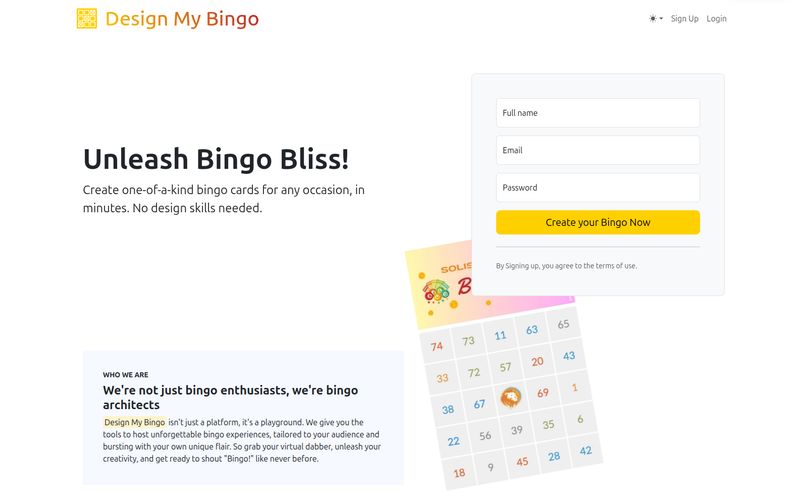If I had a dollar for every hour I've spent in a “brainstorming meeting” that could have been an email, I’d be retired on a private island somewhere, sipping something cold. We’ve all been there. The circular conversations, the one person who dominates the chat, the inevitable post-meeting scramble to figure out what was actually decided. It’s a soul-crushing time suck.
So, when I stumbled across a tool called BrainstormGPT, my professional curiosity, hardened by years of chasing traffic and decoding algorithms, was definitely piqued. The promise? To take a single topic and, using a team of AI agents, spit out a comprehensive meeting report in about 20 minutes. My first thought: “Yeah, right.” My second thought: “But what if…?”
My journey to find out more wasn't exactly smooth, I'll admit. The first thing I was greeted with was a classic “404 Not Found” page. A sign? Maybe. But for anyone in the tech or SEO space, a 404 is less of a dead end and more of an invitation to dig a little deeper. And I’m glad I did.
What Exactly is BrainstormGPT Supposed to Do?
Okay, let's get past the marketing buzz. At its core, BrainstormGPT is designed to automate the entire brainstorming and reporting process. You give it a topic—say, “Effective Link Building Strategies for a New SaaS Product”—and then you define a few roles. This is the part that got my attention.
Instead of one big AI model giving you a generic answer, BrainstormGPT creates a virtual team. You could have an AI agent playing the role of a 'Skeptical CFO', another as an 'Ambitious Marketing Director', and a third as a 'Cautious Head of Engineering'. These AI agents then “discuss” the topic amongst themselves, pulling information from automated web searches and leveraging their underlying LLM brains. It’s like setting up a virtual boardroom in a box and just letting them cook.
The platform makes a pretty bold claim: that this 20-minute process is equivalent to 300 searches, 10 hours of human discussion, and analyzing 100,000 texts. My inner SEO is both raising an eyebrow and leaning in closer. Ten hours of discussion? That’s a whole lot of nuance and human experience to replicate. But automating 300 searches? Now you're speaking my language.

Visit BrainstormGPT
Putting the “Multi-Agent” System Under the Microscope
The concept of multi-agent AI isn't brand new—it has roots in complex system modeling—but applying it to something as universally painful as business meetings feels... smart. It’s one thing to ask ChatGPT for ideas; it’s another thing entirely to have multiple AIs debate those ideas from different perspectives.
Your Own Personal AI Boardroom
The real magic seems to be in the customization of topics and roles. This is where it moves beyond a simple prompt-and-response tool. By defining roles, you're essentially programming a specific dynamic. You’re forcing the AI to consider a problem from multiple angles. For my work, I can immediately see the potential. Imagine setting up a discussion between a 'Black Hat SEO', a 'Content is King Purist', and a 'Data-Driven PPC Specialist' to thrash out a new traffic generation strategy. The potential for uncovering blind spots is huge.
From Zero to Report in 20 Minutes
Think about the typical workflow for a strategy session. Pre-reading, the meeting itself (an hour, minimum), then someone has to synthesize notes, create a summary, and define action items. That’s half a day, easy. BrainstormGPT’s pitch is to condense that entire chain of events into the time it takes to drink a coffee. The final output isn't just a transcript of an AI chat; it’s a structured report. That’s a significant step up from just copying and pasting from a chatbot window.
The Good, The Bad, and The AI-Generated
No tool is perfect, especially not in the fast-moving world of AI. Based on what I've gathered, here's my honest breakdown.
On the plus side, the time savings are obviously the main draw. It’s a productivity multiplier of an insane magnitude if it works as advertised. For solo entrepreneurs or small teams who lack the manpower for sprawling strategy sessions, it could be a godsend. The ability to get a well-rounded perspective without having to hire five different consultants is incredibly powerful. You're essentially renting a high-powered think tank on demand. I've always felt that the initial research phase is where most great ideas get bogged down in grunt work, and this seems to short-circuit that process beautifully.
But let's talk about the... complicated parts. First, the old saying holds true: garbage in, garbage out. The quality of the final report is going to be almost entirely dependent on how well you define the initial topic and roles. Vague inputs will lead to vague outputs. This isn't a magic button; it still requires strategic thinking from teh user. Second, and this is the big one for me, is the potential to miss that human spark. Some of the best ideas I’ve ever been a part of came from a weird tangent, an inside joke, or a moment of shared frustration in a meeting. An AI can simulate debate, but can it replicate serendipity? I'm skeptical. And finally, there's the privacy elephant in the room. When you're feeding a tool your next big business idea, you want to know exactly where that data is going and who has access to it. The information on this is a bit thin right now, which would give any serious business pause.
So, How Much Does This Magic Cost?
Here’s the million-dollar question. And right now, the answer is a shrug. As I mentioned, my initial attempt to check out the site led to a 404, and I couldn’t find a dedicated pricing page anywhere. This usually means a few things: the product is in a very early beta, they're operating on a custom/enterprise model, or they just haven’t gotten around to updating their site yet. Whatever the reason, the cost of entry is currently a mystery. For a tool with such a strong business-focused value proposition, that's an odd omission.
Who is BrainstormGPT Actually For?
Despite the unknowns, I can see a clear audience for this. This isn't for a casual user looking to write a poem. This is a power tool for professionals.
- Product Managers: Quickly scoping out feature requests by simulating feedback from sales, engineering, and marketing.
- SEO & Content Strategists: Generating massive topic cluster ideas, fleshing out content pillars, and even simulating a competitive analysis discussion.
- Startup Founders: War-gaming a business plan or marketing approach without needing a full-time executive team.
- Market Researchers: Creating instant reports on emerging trends by setting up agents to represent different consumer personas.
Essentially, if your job involves turning a complex topic into a structured, multi-perspective plan, this tool is aimed directly at you.
My Final Thoughts on This AI Brain Trust
So, is BrainstormGPT the meeting-killer it claims to be? Not entirely. I don't think it will ever fully replace the value of getting your sharpest human minds in a room together. But will it obliterate the need for most of the tedious, inefficient meetings that clog up our calendars? I think there's a very real chance it could.
I view it as an incredibly powerful research assistant and a first-draft generator for strategy. It’s a way to get from a blank page to a 75% complete plan in minutes. The last 25%, the part that requires true insight, context, and that human touch—that’s still on us. And honestly, that’s how it should be. The tool is promising, the concept is sound, but its real-world utility will hinge on better transparency around pricing and data security. I'll be keeping a close eye on this one.
Frequently Asked Questions about BrainstormGPT
- What is BrainstormGPT in simple terms?
- It's an AI tool that uses a team of virtual AI 'agents' with different roles to automatically research, discuss, and create a detailed report on any topic you give it, all in about 20 minutes.
- How does the multi-agent system work?
- Instead of one AI, you define several roles (like 'CEO', 'Marketer', etc.). The AIs then debate the topic from their assigned perspectives, creating a more balanced and comprehensive analysis than a single AI could.
- Is BrainstormGPT free to use?
- As of late 2023, there is no public information available about its pricing. The website doesn't list any plans, so it may be in a private beta or available for enterprise clients only.
- Can it replace human brainstorming sessions completely?
- In my opinion, no. It's a fantastic tool for generating a solid first draft of a plan and automating research, but it likely can't replicate the creativity, nuance, and unexpected breakthroughs of a great human brainstorming session.
- What kind of reports does it generate?
- It's designed to create structured meeting-style reports. This would likely include a summary of the discussion, key insights from each agent's perspective, potential action items, and supporting data from its automated searches.
- Is my data safe with BrainstormGPT?
- This is currently unclear. The platform has limited public information regarding its data privacy and security policies, which is a significant consideration for any business planning to use it for sensitive topics.



